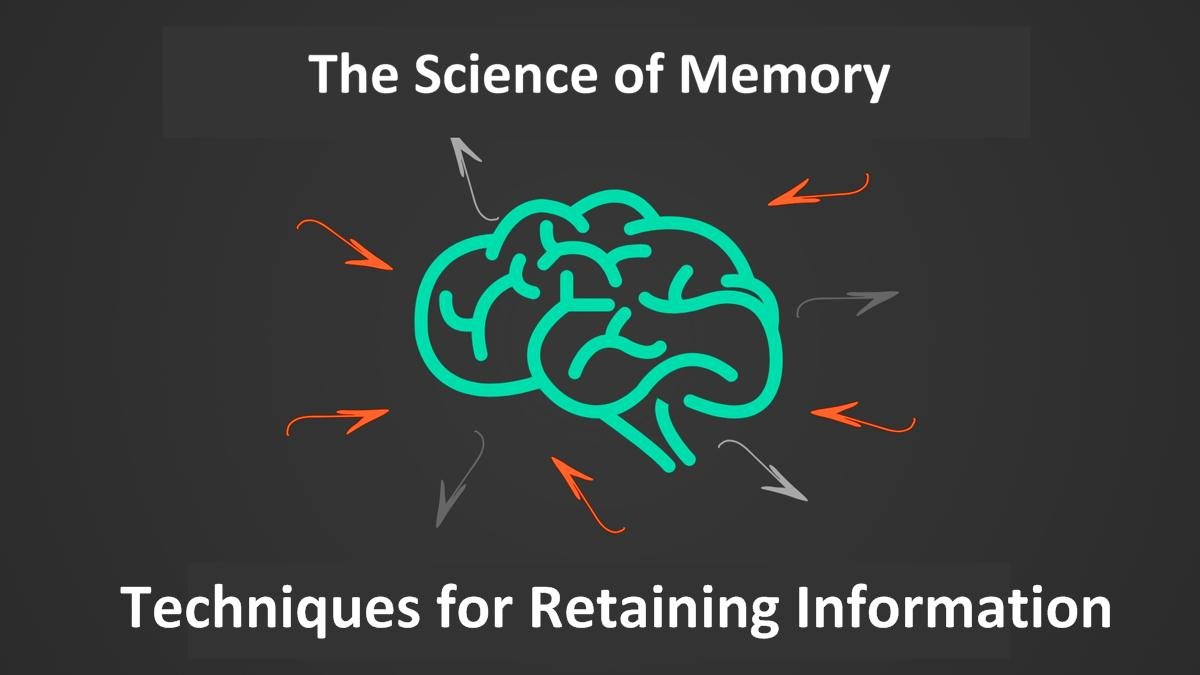The Science of Memory: Techniques for Retaining Information

Unlock the secrets of memory retention with our comprehensive guide on “The Science of Memory: Techniques for Retaining Information.” Explore the intricate process of memory, from encoding to retrieval, and discover how factors like attention, association, and sleep influence memory. Learn effective techniques like chunking, spaced repetition, mindfulness, and the method of loci to enhance memory performance. Embrace active learning to strengthen your memory and excel in various aspects of life. Improve your memory skills and boost productivity with our practical tips.
Memory is a fascinating aspect of human cognition that allows us to retain and recall information. From remembering our daily routines to recalling important facts for exams, memory plays a crucial role in our lives. However, memory is not just a simple storage system; it involves complex processes that occur in our brains. In this article, we will explore the science of memory and delve into various techniques for retaining information.
Read More: The Role of Sleep in Learning: How Rest Fuels Academic Success
Understanding the Science of Memory
The Three Stages of Memory
The process of memory can be divided into three key stages: encoding, storage, and retrieval. During encoding, the brain processes information from the external world and converts it into a form that can be stored. This stage is crucial, as the effectiveness of memory largely depends on how well information is encoded.
After encoding, the information moves into the storage stage, where it awaits retrieval. Think of it as a library where books (information) are stored on shelves (memory) until they are needed again. The capacity of our memory storage is vast, but it is not unlimited, which is why certain memories may fade over time if not accessed frequently.
The final stage is retrieval, where we access and bring forth the stored information when needed. Sometimes, retrieval can be instantaneous, while at other times, it may require effort and cues to trigger the memory.
Types of Memory
Memory is not a single entity; rather, it can be divided into various types, each serving a unique purpose:
Short-term Memory
Short-term memory is responsible for holding and processing information for brief periods. It is the kind of memory we use to remember a phone number for a short while or recall a sentence we just read. This type of memory has a limited capacity and is susceptible to interference, meaning new information can easily replace older memories.
Long-term Memory
Long-term memory, on the other hand, is designed to retain information for an extended period, ranging from days to years. It is responsible for storing our knowledge, experiences, and skills. Long-term memory has a vast capacity, and once information is well-encoded and consolidated, it can stay with us for a lifetime.
Factors Affecting Memory
Several factors can influence the efficiency of memory retention. Understanding these factors can help us develop better strategies for enhancing memory. Some of the key factors include:
Attention and Focus
Memory is highly influenced by how much attention we pay to the information during the encoding stage. When we are fully engaged and focused on the task at hand, the brain is more likely to process the information effectively and store it for later use. Distractions and divided attention, on the other hand, can hinder the encoding process and lead to poorer memory retention.
Association and Linking
Creating meaningful associations between new information and existing knowledge is a powerful memory technique. Our brains are more likely to remember information that is connected to something we already know. For example, associating a new concept with a familiar metaphor or linking it to a personal experience can aid in memory retention. Mnemonic devices, such as acronyms or visualization techniques, are also effective ways to create associations and aid in memory recall.
Sleep and Memory Consolidation
Sleep is essential for memory consolidation, a process where the brain solidifies and strengthens memories. During deep sleep stages, the brain replays and processes the information acquired during the day. This consolidation process enhances the transfer of memories from short-term to long-term storage, improving overall memory retention.
Emotional Significance
Emotional experiences tend to leave a stronger imprint on our memories. Events that evoke strong emotions, whether positive or negative, are more likely to be remembered vividly and for a more extended period. This is why personal experiences, especially those tied to emotions, are often better retained in memory than neutral or mundane information.
Memory Improvement Techniques
Improving memory is not a mysterious endeavor; it involves employing effective strategies and techniques. Here are some proven methods for enhancing memory retention:
Chunking
Chunking is a technique that involves breaking down large pieces of information into smaller, more manageable chunks. For instance, when trying to remember a long string of numbers, grouping them into smaller sets or meaningful sequences can make the task easier. By organizing information into chunks, the brain can handle more significant amounts of data efficiently.
Spaced Repetition
Spaced repetition is a learning technique that involves reviewing information at increasing intervals over time. Instead of cramming all the information at once, spaced repetition spreads out the review sessions, reinforcing memory retention. This approach helps to move information from short-term to long-term memory and prevents forgetting over time.
Mindfulness and Meditation
Practicing mindfulness and meditation can be beneficial for memory improvement. By reducing stress and promoting relaxation, these practices create an environment conducive to effective memory encoding and retrieval. A calm and focused mind is more adept at absorbing and retaining information.
The Method of Loci
The method of loci, also known as the memory palace technique, is an ancient memory strategy dating back to Roman times. It involves associating information with specific locations or objects in a familiar setting, such as a house. The information is mentally “placed” in different rooms or areas, and during retrieval, the individual mentally walks through the location to recall the associated information. This technique taps into our spatial memory and is particularly effective for remembering lists or sequences.
Active Learning
Engaging in active learning activities can significantly improve memory retention. Instead of passively consuming information, active learning involves participating in discussions, teaching others, and applying knowledge in practical situations. Actively engaging with the material reinforces memory and deepens understanding, making the information more memorable.
Read More: The Science of Effective Studying: Strategies for Success
Conclusion
Memory is an intricate and vital cognitive function that influences our daily lives in countless ways. Understanding the memory process and employing techniques for retaining information. By paying attention, creating associations, getting sufficient sleep, and practicing memory improvement techniques, we can unlock the full potential of our memory and lead more successful and fulfilling lives.
FAQs
What is the role of attention in memory retention?
Paying close attention during the encoding process improves the likelihood of effective memory storage. When we are fully focused on the information, the brain processes it more deeply, leading to better memory recall later on.
Can mindfulness and meditation improve memory?
Yes, practicing mindfulness and meditation can indeed improve memory retention. By reducing stress and promoting relaxation, these practices create a conducive environment for effective memory encoding and retrieval.
How does spaced repetition help in memory improvement?
Spaced repetition involves reviewing information at increasing intervals over time. This method reinforces memory retention by repeatedly exposing the brain to the information, leading to better long-term memory storage.
Is the method of loci suitable for everyone?
Yes, the method of loci is a memory technique that can be used by anyone. It capitalizes on our spatial memory, making it an effective strategy for enhancing memory recall.
What are some active learning activities to enhance memory?
Engaging in discussions, teaching others, and applying knowledge in real-life situations are effective active learning techniques. When we actively participate in the learning process, our brains process information more deeply, making it easier to remember and recall later.







